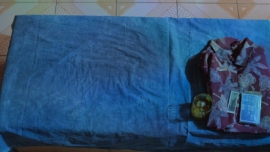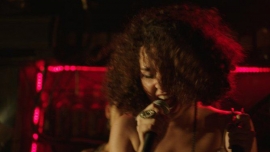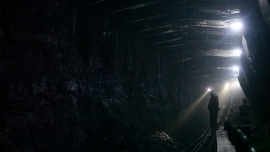"If I think about the future of cinema as art, I shiver" (Y. Ozu, 1959)
Kaili Blues (Bi Gan)
Tuesday, 23 February 2016 12:00The Sort of Song That Plays Only in Your Dreams
James Lattimer
With every first film you watch, you enter unchartered territory. You have no idea what awaits you, you have no experience to draw on and there’s nothing to guide you on your way. You can only give yourself up to the journey and hope the filmmaker is skilled at marking out the terrain; every good filmmaker must also be a good mapmaker. But how do you make a good map if you’ve never made one before? If your map draws too heavily on established routes, the trip is unlikely to be memorable; if it leads too far out into the wilderness, you’re going to lose people along the way. The best maps take you by the hand but still allow you to wander, they give structure but they do not dictate, they mark out paths but allow them to lead anywhere.
Bi Gan’s Kaili Blues spends most of its time charting a series of woozily interconnected trips, between Kaili and Zhenyuan, between past and present, between all the shifting layers of a dream. If, as the Diamond Sutra quote that opens the film suggests, neither the past, present nor future mind can be found, Kaili Blues is about tracking the sublimely futile process of looking for it. This is a place where you see the blue cassette long before it’s actually given to you, where you watch the train that will later return you to Kaili pass through the room in front of you, where there are so many different shots of protagonist Chen Sheng with his eyes closed it’s impossible to determine where one of his dreams stops and the next begins.
So the terrain Bi chooses to map out is an ambitious one. Rather than sticking with the standard three-dimensions of space, he augments his selected swathe of Guizhou province with the additional dimension of time, smearing the boundaries yet further by letting everything be governed by the unruly laws of Chen’s slumbering mind; we shouldn’t forgot he’s a poet after all. It’s thus often hard to say what exactly connects each individual scene, with the temporal, the causal, the spatial or the associative providing equally valid answers, if indeed there is any definitive answer at all. A nostalgic story of keeping hands warm with a torch suddenly cuts to a shot of two unidentifiable hands bathed in red light and tightly clasped together, a motorcycle repair is interrupted by an impromptu piece of bulldozer ballet and when Chen and his nephew Weiwei take a ride in an overgrown amusement park, the camera shows no qualms in detaching itself from their perspective. Just like in Chen’s poems, it’s not about their meaning, it’s about their rhythm.
It’s easy to imagine how all this unbounded freedom might get out of hand and in lesser hands it might, but Bi proves himself to be nothing if not a master mapmaker. His approach to cartography is not about ploughing familiar furrows or leading you up the garden path, but rather scattering the terrain with enough signposts to let you make your own way. These signposts are what other films would relegate to the status of mere objects, they are points of constant reference content to lurk in the background, even as they cut across four whole dimensions and an entire subjectivity. Each insignificant when taken by itself, together they form a lattice that reaches every corner of the film; no matter when or where you might end up, the objects around you offer repose.
Chen is given three objects to take with him on his way to Zhenyuan - the photograph of a friend of his elderly colleague Guang Lian, the cassette he once gave to her and the shirt she agreed to buy for him - and each get its chance to shine. The contents of the cassette soundtrack Chen’s trip to his mother’s grave; once two replacement buttons have been sewn back on, the shirt is a perfectly familiar outfit to wear in a perfectly unfamiliar place; the photograph is the one way for Chen to know he’s finally reached his goal. These three objects are flanked by countless others: the white dogs that may or may not have taught the locals how to fuck, myriad motorbikes and mirrorballs, blue shoes carried along by the current, pool tables that pop up again despite the camera having shaken off the protagonist, endlessly proliferating watches and clocks: drawn on wrists, painted on walls, covered with a scattering of buttons, spinning back through time as a train passes alongside.
And if all these tangible objects aren’t enough to help you get your bearings, there are more than enough intangible ones on hand to do the same job: the wild men covered in brown hair that are never seen, but seem to be on everyone’s lips, the apparently unmotivated camera movements in the first half of the film whose job it is to prepare you for its wild wanderings in the second, all the facts and figures that make up Kaili stored in the head of a girl who carries the same name as Chen’s wife, her recitations only halted by someone else who also happens to be called Weiwei.
While all these recurring elements function perfectly as signposts, they also resemble the motifs of a perfectly composed song; it’s not for nothing that the film is called Kaili Blues. Perhaps that’s Bi’s most singular achievement, his willingness to rely on rhythm to illuminate an unchartered terrain. How many other first features can you say that about? Much like Chen’s spontaneous final performance, Bi’s is a melancholy number, the perfect soundtrack to a life full of regret, a song that echoes across misty roads, crumbing buildings, dark tunnels and deep valleys, the sort of song that plays only in your dreams.
À peine j’ouvre les yeux (Leyla Bouzid)
Tuesday, 23 February 2016 03:00I veri nemici dell’Isis
Roberto Silvestri
Le primavere arabe fanno bene al cinema. I tabù saltano. Alla Berlinale 2016 un esordio tunisino arriva in concorso, Inehebbek Hedi, di Mohamed Ben Attia e tutto il mondo islamico è sotto shock per Much loved, del marocchino Nabil Ayouch, sulle squadre di prostitute specializzate in giochetti erotici per magnati sauditi, proibito ma visto da tutti, sia nel maghreb che nel mashreq. Il linguaggio delle ragazze è spudoratamente di strada. Un dialetto volgarissimo, con battute umoristiche a mitraglia piene di fuck e bestemmie, che si fa carezzevole nelle scene romantiche, quando le ragazze cambiano letteralmente lingua e sussurrano con il lessico delle star egiziane (in The Wolf of Wall Street si dice cazzo o derivati 569 volte, ma qui la fantasia va oltre). C’è qualcosa di Wakamatsu e delle nouvelle vague anni ‘60 in Madame Courage del veterano algerino Merzak Allouache che in trent’anni di onesta radiografia della società martoriata, mai aveva osato parlare male, attraverso le avventure di un debosciato, Omar, delle mostruose mamme sottoproletarie o deambulare in baracche puzzolenti senza acqua degli slum, come neanche Pedro Costa.
Ma l’esordio dell’anno è À peine j’ouvre les yeux di Leyla Bouzid, figlia d’arte, regista, sceneggiatrice e attrice che ha preparato la versione femminile del film di Allouache. Una studentessa middle class destinata dai genitori alla Medicina dice no e fa rock-folk maghrebino con il suo gruppo di capelloni sfrontati, sovversivi e angariati dalla polizia segreta. Il film è ambientato a Tunisi, prima della rivoluzione “per la libertà e per la democrazia” e ci trasmette quella rabbia fatta contagiante ritmo di lotta che cacciò Ben Alì e altri despoti della zona. Il ruolo della musica (metallara soprattutto) in quelle sollevazioni dal basso è stato raccontato in libri e saggi ma questo film lo assume come stile e, più che farci la cronaca di una rottamazione e osannare come in un musicarello nostrano chi combatte i castranti Mario Carotenuto locali, è commuovente perché collega le generazioni sconfitte del passato con questa vincente, tornando molto indietro nel tempo, attraverso la musica, fino al 1981 e a Trances, il rock-movie da qualche anno restaurato da Martin Scorsese nel quale si rendeva onore alla pioneristica band marocchina Nass el Ghiwane, che, come i nostri Mc5 o Fugs, aveva cambiato il mondo e le gerarchie dei sessi che lì dove sembrano inscalfibili. Lo scatenamento della soggettività desiderante a Tunisi vuol dire anche la conquista del bar malfamato e del far tardissimo di notte, crea resistenza in famiglia e fuori, anche se chi agisce non è costretto, come nel caso di Omar, alla criminalità individuale o organizzata. Lei canta. Bellissime canzoni d’amore e micidiali song di lotta. Innestando chitarre elettriche sganciate dalle regole ferree con le armonie tradizionali incalzanti e ipnotche a forma di oud, tablah, riqq, mizhmar e kamanjah. È la Joe Strummer di un immenso Clash di massa (e che sia cacofonica per le orecchie addestrate all’arabesque arabo è sicuro, amici arabi anche anticonformisti non possono sentirla, ma chi ha visto Rude boy sa che storpiare la melodia, schiaffeggiandola sia da destra che da sinistra, vuol dire sperimentare nuove consonanze). E la questura, meno stupida di quanto non si pensi, non lo permette. Chiude i locali che l’hanno scritturata, costringono chi affitta cantine a cacciarli. I genitori, poi, non ne parliamo. E perfino un membro della band comincia a remare contro, perchè in realtà è un travestito, ma di quelli che piacciono anche ai bigotti, un poliziotto, perché di informatori della polizia era infarcita tutta la società incivile di Ben Alì. Fino a che perfino la nostra eroina rischia per gelosia di mandare tutto a monte perché litiga con l’altro leader della banda. A quel punto la polizia segreta rapisce la ragazza e le dà una di quelle lezioni che avranno gli effetti boomerang che conosciamo. Rivoluzione. Questo film “apre gli occhi” dello spettatore occidentale infatti sulla difficile lotta di quella generazione che si è trovata di fronte una dittatura dall’aspetto vellutato e dalla realtà micidialmente attenta a reprimere ogni anelito di libertà. Foucault che insegnava a Tunisi se ne accorse e ce lo ha raccontato. Coraggiosissimi i tunisini allora e ora, in fabbrica nei campi, nel commercio, nelle scuole, nelle strade. C’erano le elezioni? Ben Alì il moderatore rendeva introvabili le schede elettorali alle persone tra i 18 e i 30 anni e il gioco era fatto per il partito al potere, membro dell’internazionale socialista. Oppure. Vogliamo parlare del sesso? Oppure, più semplicemente. Vogliamo andare al bar a berci una coca? Non era così semplice, almeno per una ragazza, con il velo o con i jeans strappati. Lo vedremo nel film questo penetrare nella notte negli spazi occupati dai soli uomini. E vedremo come si riesce a liberarli. Grazie alla musica. Il “musical” tocca punte hard insospettabili. E fa capire che sono stati questi ragazzi i veri eroi che hanno capovolto il mondo. E che facevano bene a reprimerli, i metallari, i rockettari e i folk singer del maghreb e del mashreq, perchè stavano, e stanno, sconvolgendo il mondo islamico e sono i veri nemici dell’Isis e di tutti gli Isis non islamici che avvenenano la vita anche in Occidente.
Aragane (Kaori Oda)
Tuesday, 23 February 2016 07:00Una visita in miniera
Lorenzo Esposito
In attesa, un giorno, di fare la necessaria ricognizione sulla factory bosniaca di Béla Tarr (e magari aggiungere capitoli alla sua cosiddetta filmografia interrotta), è il caso di soffermarsi su questa sua studentessa giapponese, Kaori Oda, e su una sua visita in miniera. In principio fu Kafka. Secondo il compito assegnatole dal professor Béla, un possibile adattamento da Il cavaliere del secchio (e si capisce, non sembra forse questo proprio l’inizio di un film di Béla Tarr? “Tutto il carbone consumato; vuoto il secchio; assurda la paletta; la stufa che manda freddo; la stanza gonfia di gelo; davanti alla finestra alberi irrigiditi dalla brina; il cielo uno scudo d’argento contro colui che gli chiede soccorso”). Così Kaori, che da bambina sognava di giocare a pallacanestro e che un brutto incidente al ginocchio ha magicamente deviato verso il cinema, prende il suo secchio particolare, la camera, e scende in miniera. Qui tuttavia non trova Kafka, ma un dedalo di abissi tunnel macchine spazi e uomini, che la spingono a ripensare la sua presenza in quelle profondità in modo che il documento possa dispiegarsi a partire da una base non così strettamente letteraria (e Béla, che vede il girato, approva). Eppure di Kafka mantiene il senso unico del luogo, l’ora agghiacciante di un singolo luogo preso nel suo tempo e nella sua illusione: lunghi piani sequenza, un appostamento gentile e determinato insieme, per nulla impaurito dal buio, gli operai stessi pensati come fasci di luce, macchinari che si fondono con le carrellate mentre fondono il carbone e affondano ogni cosa, compresi i fuori fuoco, parte fondante dell’ipnotica compressione sotterranea. E ovviamente nessun intento sociale, perchè è già tutto nel parallelo gioco dei volumi dato dallo spazio e dal distribuirsi delle ombre per tagli dissezioni e autentici buchi neri. La verità è che Kaori Oda, con la semplice decisione di filmare tutto da sola con la sua Canon, e quindi di appoggiarsi al puro sound/recording, aiutata da una sola fonte di luce proveniente dal suo caschetto, ottiene una sorta di tutt’uno occhio/macchina/spazio che è in sé contemporanea riflessione politica sul lavoro e sulla posizione del cineasta tout court. È appassionante inoltre vedere come tutto ciò sia al tempo stesso a uno stato larvale, di intuizione pura, riportando bene il difficile rapporto che c’è oggi fra facile immediatezza del filmare (grazie al digitale) e desiderio di non rinunciare alla complessità del pensiero, seppure appena intravisto (e infatti è la regista stessa che, dopo aver precisato che ancora non sa bene cosa fare e che sta solo esplorando, non fatica però a indicare come punti di riferimento Pedro Costa, Wang Bing, Raymond Depardon, Frederick Wiseman…). L’epilogo di Kafka è ancora una volta perfetto: “La mia cavalcata non ha più senso, perciò sono smontato e porto il secchio su una spalla”.
Ultimi articoli pubblicati
- 2025-03-24 Chime/Cloud/Serpent’s Path (Kurosawa Kiyoshi)
- 2025-03-24 Abiding Nowhere (Tsai Ming-liang)
- 2025-03-24 The Box Man (Gakuryū Ishii)
- 2025-03-24 Grand Tour (Miguel Gomes)




